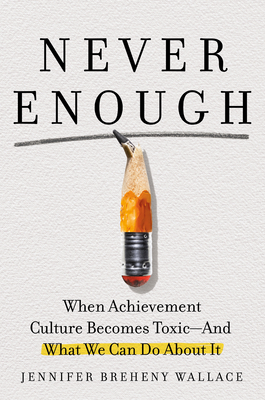Never Enough Book Summary
When Achievement Culture Becomes Toxic-and What We Can Do About It
TL;DR
In "Never Enough," Jennifer Breheny Wallace unravels the toxic achievement culture that pressures today's youth, revealing its detrimental effects on mental health and advocating for a shift towards valuing intrinsic self-worth.
What is Never Enough about
"Never Enough" explores the overwhelming pressure children face in a society fixated on achievement and success. Author Jennifer Breheny Wallace, through extensive research and interviews, highlights how this toxic culture leads to increased anxiety, depression, and self-harm among high-achieving students. Wallace argues that the drive to excel is not merely a choice made by families; it is deeply rooted in societal norms and exacerbated by economic inequality. By fostering a sense of intrinsic self-worth and teaching children that they matter beyond their accomplishments, Wallace proposes a compassionate framework to combat the detrimental effects of achievement culture.
Never Enough 8 Key Takeaways
Toxic Achievement Culture
Today's students face immense pressure to excel, leading to a detrimental mental health crisis, as they sacrifice relationships and well-being for success.
The Role of Parents and Educators
Wallace emphasizes that parents and educators must shift their focus from performance to fostering intrinsic self-worth in children.
Impact of Societal Norms
Society's increasing emphasis on achievement is linked to economic disparity, pushing families to prioritize success over mental health.
Mattering and Self-Worth
Children need to feel valued for who they are, not just for their achievements; this 'mattering' is crucial for their psychological security.
Resilience Through Validation
Kids who receive validation that they matter, regardless of performance, are more likely to develop resilience and confidence.
A Call for Change
Wallace advocates for community-wide changes that promote mental well-being over competitive success, providing a practical toolkit for positive transformation.
Community Contributions
Teaching children to see themselves as valuable contributors to their communities can help counteract the pressures of achievement culture.
Urgency of the Issue
The book presents an urgent call to reevaluate how society measures success and prioritize the well-being of youth.
Top Never Enough Quotes
- "In today's world, many children believe their value is defined solely by their achievements, rather than who they are at their core."
- "True success lies in teaching our children that they matter, regardless of their performance or accolades."
- "Fostering intrinsic self-worth is essential in combating the pervasive pressures of achievement culture."
Who should read Never Enough?
This book is ideal for parents, educators, and community leaders seeking to understand and counteract the harmful effects of achievement culture on youth. Readers will find practical strategies to foster resilience and self-worth in children, ultimately guiding them towards a healthier approach to success.
Never Enough Best Reviews
- "A powerful exploration of how our need to achieve is harming our children. Wallace's insights are both timely and essential for today's parents and educators." - New York Times Review
- "An urgent and necessary read that challenges the conventional wisdom of success and offers a compassionate alternative." - The Washington Post
- "Wallace's thorough research and compelling narratives make this book a must-read for anyone concerned about the future of our youth." - The Guardian
People also liked these summaries
Never Enough FAQs
What is the main argument of Never Enough?
The main argument of 'Never Enough' is that the current achievement culture is damaging to children, leading to mental health issues, and that we must prioritize intrinsic self-worth over external accomplishments.
How does Wallace propose we combat toxic achievement culture?
Wallace suggests fostering a sense of mattering among children, emphasizing their intrinsic value rather than their achievements, and promoting community engagement as a buffer against pressure.
What age group is this book targeted at?
This book is primarily targeted at parents and educators of school-aged children and adolescents, aiming to provide insights into the pressures they face and how to support their well-being.


